Área de título y declaración de responsabilidad
Título apropiado
FHYA selection from the Royal House of Dlamini Series
Tipo general de material
- Documento textual
- Objeto
Título paralelo
Otra información de título
Título declaración de responsabilidad
Título notas
- Fuente del título: FHYA using WITS materials
Nivel de descripción
Serie
Institución archivística
Código de referencia
Área de edición
Declaración de edición
Declaración de responsabilidad de edición
Área de detalles específicos de la clase de material
Mención de la escala (cartográfica)
Mención de proyección (cartográfica)
Mención de coordenadas (cartográfica)
Mención de la escala (arquitectónica)
Jurisdicción de emisión y denominación (filatélico)
Área de fechas de creación
Fecha(s)
-
2016 - (Online curation)
-
c.1968 - c.1982 (Interview-recording)
Área de descripción física
Descripción física
- 7 Notebooks
- 3 Rejected Edited Typescripts
- 2 Index Cards
- 2 Floppy Disk Labels
- 2 Original Collection Boxes
- 2 Folders
- 2 Original Collection Box Labels
Área de series editoriales
Título apropiado de las series del editor
Títulos paralelos de serie editorial
Otra información de título de las series editoriales
Declaración de responsabilidad relativa a las series editoriales
Numeración dentro de la serie editorial
Nota en las series editoriales
Área de descripción del archivo
Historial de custodia
[Source - Chloe Rushovich for FHYA using Wits materials, 2017: In the mid-1960s King Sobhuza II commissioned a series of interviews about the history of Swaziland. The primary interviewer in charge of this undertaking was Isaac Dlamini, who was one of Sobhuza’s personal aides. He was assisted in the interview process by Maboya Fakudze and Mahlaba. Some of the transcription and translation work on these interviews was done by Ruth Mavimbela, and possibly also by Rotter Sicheme Mamba. This material was donated to the Swaziland Oral History Project in the late 1980s. In 2012, the Wits Historical Papers undertook to digitize the recorded interviews. This was made possible by a grant from the Carnegie Foundation. A full copy of the digitized recorded interviews was deposited by the Wits Historical Papers in the University of Swaziland Library. In 2014 the Five Hundred Year Archive commissioned Patricia Liebetrau, a metadata librarian who had worked on the Digital Imaging South Africa project, to undertake the digitization of a selection of the transcripts from the recordings made by Isaac Dlamini for the Royal House of Dlamini.]
Alcance y contenido
[Source - Chloe Rushovich for FHYA using Wits materials, 2017: In the mid-1960s King Sobhuza II commissioned a series of interviews about the history of Swaziland. These interviews were conducted across the length and breadth of Swaziland from the mid-1960s to the early 1980s. They embrace a range of historical topics, notably the origins of the people of Swaziland, as well as the origins of its many chieftaincies. These interviews display a strong regional emphasis, and were conducted, in part, as a part of a program undertaken by the Swazi monarchy for the recovery and reinvigoration of Swaziland’s customs and traditions in the 1960s and 1970s. The transcripts selected were those for which a typed-up summary or typed edited typescript already existed. The rationale for this was that the typed version, unlike the handwritten versions could be subjected to optical character recognition and are thus searchable. The linked typed texts therefore act as a kind of index to the handwritten texts and the recorded audio. In 2014 the Five Hundred Year Archive commissioned Patricia Liebetrau, a metadata librarian who had worked on the Digital Imaging South Africa project, to undertake the digitization of a selection of the transcripts from the recordings made by Isaac Dlamini for the Royal House of Dlamini. This selection of transcripts, as well as the already digitized audio, the rejected experimental edited typescripts, and associated materials such as collection boxes, index cards, folders, audio tape cassettes and case labels, and notebooks, formed the FHYA selection from the collection of Royal House of Dlamini recordings. The Royal House of Dlamini series is separated into ‘files’ named after each interlocutor.]
Área de notas
Condiciones físicas
Origen del ingreso
Arreglo
Idioma del material
Escritura del material
Ubicación de los originales
Disponibilidad de otros formatos
Restricciones de acceso
Condiciones de uso, reproducción, y publicación
Creative Commons License: CC BY-NC-ND
https://creativecommons.org/licenses/by-nc-nd/3.0/
Unless otherwise stated the copyright of all material on the FHYA resides with the contributing institution/custodian.
Instrumentos de descripción
Finding Aids
Inventory for A2760
http://www.historicalpapers.wits.ac.za/?inventory/U/collections&c=A2760/R/6387


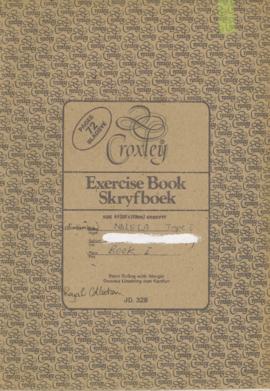



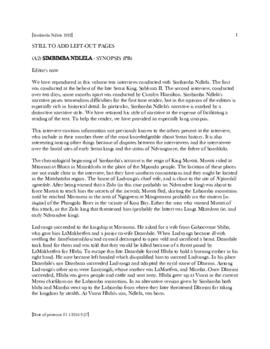



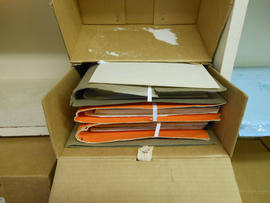
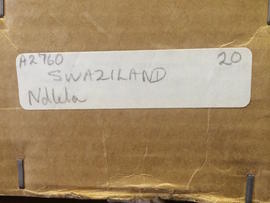
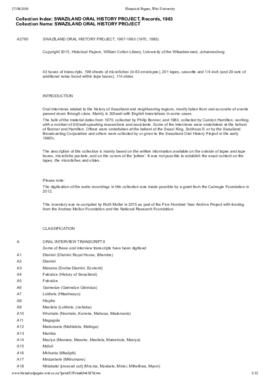


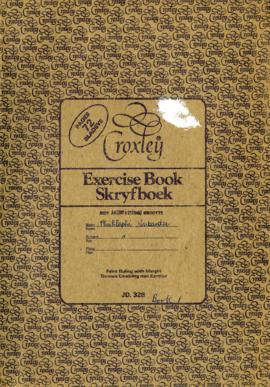
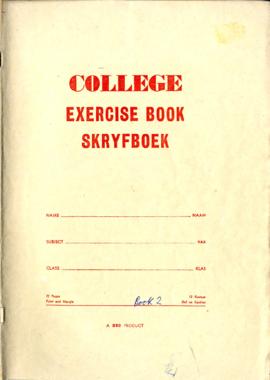
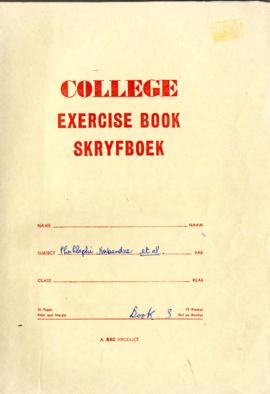
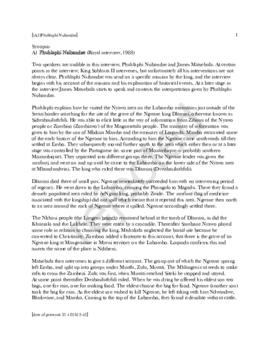

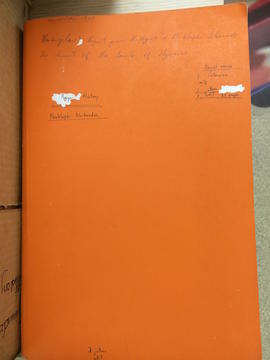
Material contributed by members of the public
Building an archive is a collective endeavour. Please help us grow the FHYA knowledge base.
If you want to add information to this page you can insert a hyperlink, add files and/or text to the box below.
In the case of material relevant to the FHYA as a whole please upload information HERE.
The FHYA does not vet this material but reserves the right to remove anything deemed to be racist, homophobic, sexist or otherwise offensive. Everything on the FHYA is licensed under a Creative Commons CC BY-NC-ND licence.
To make a contribution you must be a registered user. To register an account, click here. Note that after registration you will not be automatically redirected to this page.
If you have already registered but are not logged in, log in here.